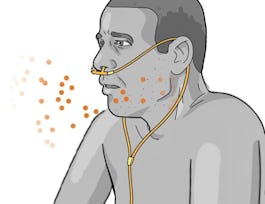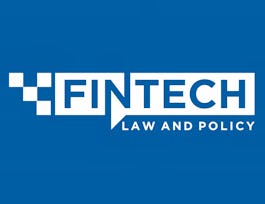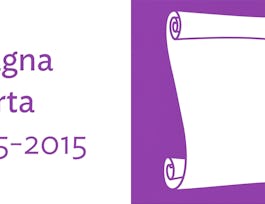This course introduces learners to applied public history: understanding and interpreting the past today, and engaging diverse communities in the practice of making and sharing histories. The course draws on project case studies, expert insights and diverse perspectives to model exciting approaches to researching and sharing the history of places and people. Learners will develop a toolkit to apply in their own practice, by participating in discussion, quizzes, creative activities and mini masterclasses.



Applied Public History: Places, People, Stories

Instructor: Catherine Clarke
6,133 already enrolled
Included with
(96 reviews)
Skills you'll gain
Details to know

Add to your LinkedIn profile
16 assignments
See how employees at top companies are mastering in-demand skills


Earn a career certificate
Add this credential to your LinkedIn profile, resume, or CV
Share it on social media and in your performance review

There are 6 modules in this course
In this first week, we’ll meet the course presenters, and explore place and history with help from Historic England, Layers of London and others. How do we get a sense of the history and heritage of a place, and how can we involve our communities in understanding the historic environment? We’ll look at the professional practice of describing historic places and buildings, as well as what maps can reveal about place and history – with special access to historic maps in the Institute of Historical Research archive, and reflections on 'deep mapping' in the crowdsourced Layers of London project. There's also a chance for you to introduce yourself: the first step in forming our virtual community and sharing our varied experiences and expertise.
What's included
5 videos2 readings3 assignments2 discussion prompts
This week, we'll explore some fantastic case-study projects, to discover fascinating stories from history, and approaches to recovering and sharing the past. With the help of Youth Club Archive, we'll reflect on different approaches to collecting and telling stories, with varied audiences in mind. Through the Victoria County History 'Red Boxes' project, we'll look at how stories can be told through objects. And we'll look at how a project gathering the oral histories of Syrian refugees brings together different participants and communities.
What's included
3 videos2 readings2 assignments1 peer review1 discussion prompt
Where does applied public history meet creative practice? This week, we'll learn from a range of projects to explore what art, and artistic collaborations, can bring to interpretation of the past, to examine historical re-enactment and costumed interpretation, and to look at how a creative approach to mapping might draw a place and its history in imaginative, thought-provoking and engaging ways. There's also an opportunity to try your own creative skills by joining in a creative masterclass! Whether you're naturally an artistic type or not, this week is an opportunity to consider creative approaches for your own applied public history work and projects, and to reflect on what these methods facilitate.
What's included
3 videos2 readings3 assignments2 discussion prompts
Anniversaries, statues, blue plaques and monuments - history is all around us in the present, in our places and in our public debates. This week, we'll examine how history is commemorated today, with attention to lines of exclusion and absences. We'll look at strategies for mobilising history to make positive interventions in present-day society, with perspectives from the #RememberHer project on female memorials in London, the Haringey Peace Forum (working on World War 1 conscientious objectors), and History Workshop Online, with their activist approach to 'history of the present'.
What's included
3 videos2 readings3 assignments2 discussion prompts
How do you transform an 'audience' into active researchers? What can engaged, participatory research and co-production add to our understanding of the past and its significance in the present? This week we'll talk to Layers of London, the Victoria County History in Leicestershire, and the Runnymede Trust's 'Our Migration Story' project team, to explore new approaches to uncovering history, from community archive work to crowdsourcing.
What's included
2 videos3 readings3 assignments2 discussion prompts
Applied Public History is all about communication. This week, we'll return to the core thread of communication which has run across the course, consolidating our skills with attention to some new case studies, and returning to others. We'll also step back and think about evaluation and how to identify opportunities for future development - including a chance for you to reflect on your own participation in this course. We'll hear from projects including 'Being Human' - a National Festival of the Humanities, Layers of London, #RememberHer, and more.
What's included
2 videos3 readings2 assignments1 peer review2 discussion prompts
Instructor

Offered by
Recommended if you're interested in History

Stanford University

Duke University

Google Cloud

University of London
Why people choose Coursera for their career




Learner reviews
Showing 3 of 96
96 reviews
- 5 stars
84.53%
- 4 stars
15.46%
- 3 stars
0%
- 2 stars
0%
- 1 star
0%

Open new doors with Coursera Plus
Unlimited access to 7,000+ world-class courses, hands-on projects, and job-ready certificate programs - all included in your subscription
Advance your career with an online degree
Earn a degree from world-class universities - 100% online
Join over 3,400 global companies that choose Coursera for Business
Upskill your employees to excel in the digital economy
Frequently asked questions
Access to lectures and assignments depends on your type of enrollment. If you take a course in audit mode, you will be able to see most course materials for free. To access graded assignments and to earn a Certificate, you will need to purchase the Certificate experience, during or after your audit. If you don't see the audit option:
The course may not offer an audit option. You can try a Free Trial instead, or apply for Financial Aid.
The course may offer 'Full Course, No Certificate' instead. This option lets you see all course materials, submit required assessments, and get a final grade. This also means that you will not be able to purchase a Certificate experience.
When you purchase a Certificate you get access to all course materials, including graded assignments. Upon completing the course, your electronic Certificate will be added to your Accomplishments page - from there, you can print your Certificate or add it to your LinkedIn profile. If you only want to read and view the course content, you can audit the course for free.
You will be eligible for a full refund until two weeks after your payment date, or (for courses that have just launched) until two weeks after the first session of the course begins, whichever is later. You cannot receive a refund once you’ve earned a Course Certificate, even if you complete the course within the two-week refund period. See our full refund policy.

